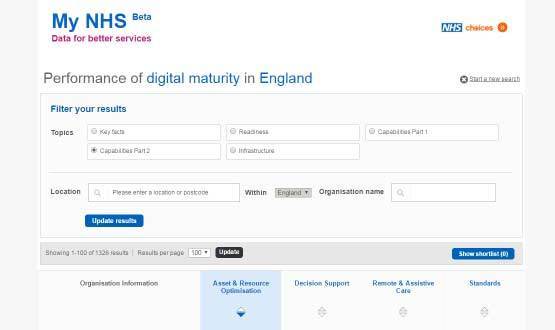NHS England publishes ‘mixed’ picture of digital maturity
- 12 April 2016

NHS England has published data on a series of self-reported digital maturity measures for 239 NHS trusts.
Paul Rice, head of technology strategy at NHS England, said: “the data published is self-assessment from 239 NHS trusts on their judgement of their readiness to exploit digital technologies. It details their view of whether the have the capability to exploit and highlights how far have got.”
He described the overall picture on NHS ‘digital maturity’ nationally as “mixed”. “The high level summary on digital maturity is good, but with opportunities to improve,” he said.
Nationally, “the picture is quite good on access to care records, but the picture is less good on access to e-prescribing”, added Rice.
NHS England is at pains to stress that the new Digital Maturity Index is not a league table.
Rice told Digital Health News: “some organisations are doing extremely well, and optimising the opportunity to use digital; others are more variable; while some orgs are struggling in all aspects, and what they’ve done is candidly identify themselves to us – so we can help them begin to improve.”
The data is said to describe the current digital maturity of all NHS providers and will, together with Local Digital Roadmaps and Sustainability and Transformation Plans due to be submitted to NHS England in June, help determine how future investments in digital technology are made.
“This is all about understanding the extent to which digital technology is an enabler of service transformation and not an end in itself,” said Rice.
The data was published this morning on the myNHS beta website, enabling members of the public to look up how a particular trust scores in three areas of digital maturity: readiness, capability and infrastructure. Users can then drill down into a number measures held in each of these topics.
NHS England says the digital maturity measures are primarily a self-help tool that will enable trusts to understand how they are doing and inform their future planning.
“This was about providing information to front-line organisations and helping them plan their digital maturity roadmap, and to have those discussions with them on how they will make progress,” said Rice.
“The primary value is for local organisations and their partners to get a better picture on what it is like today.”
He declined to say who the data identifies as the most digitally advanced NHS organisations.
“The reality is that it is variable, we have organisations that can rightly regard themselves as world class and others that need support.”
However, the raw data published today suggests Liverpool Women’s NHS Foundation Trust and Salford Royal NHS Foundation Trust are among the top performers, while Devon Partnership NHS Trust, Norfolk and Suffolk NHS Foundation Trust and London Ambulance Service NHS Trust are among the lowest.
Rice also said it was still unclear on how the digital maturity data will inform future funding.
“We don’t have fine detail on that yet. It will be linked to local digital roadmaps and linked to STPs. Over summer we will validate those plans and early part of autumn will make announcements about investments.”
Asked whether investment would go to the leaders or laggards he said “investment is required in a number ways, we want to see best get better and bootstrap those who are further back, but there will be a point in future where it won’t be acceptable to not getting better on digital maturity.”
He stressed that it was important that whole question of local priorities will be locally led, particularly on where STP investment is needed and that, “digital is only one part of the changes needed.”
With the perception that money will be tied to DMI scores, comes the risk of gaming results.
“I’m confident in the data,” said Rice, “we’ve asked people to be candid and this data will be most useful locally.”




